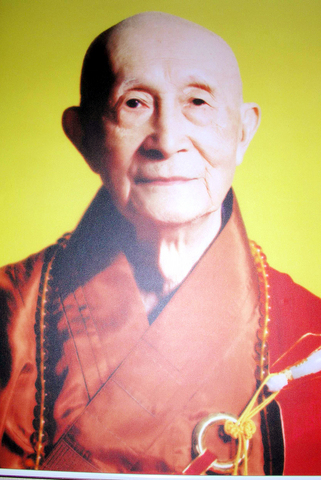Dharma Master Yin Shun (印順法師), who is credited leading a renaissance in Chinese Buddhism, passed away in Hualian's Tzu-Chi Hospital on Friday, aged 100.
Yin Shun was a mentor to Master Cheng Yen (證嚴法師) the founder of the Buddhist Compassion Relief Tzu-Chi Foundation, and was honored by Tzu-Chi members as their "Shih Kung" (Teacher Patriarch).
He was a pioneer in developing the concept of "humanist Buddhism," the need for the monastic community to engage with the mundane world.

PHOTO: TSAI CHANG-SHENG, TAIPEI TIMES
At a press conference yesterday, Master Shih Chao-hui (
Chao Hui said Yin Shun was a harsh critic of the superstition and idolatry into which Mahayana Buddhism had sunk, and abhorred the conflicts between various sects within the faith.
Although Yin Shun is closely associated with the Tzu-Chi Foundation, he has had a decisive influence on others of the new generation of Buddhist masters such as Master Sheng Yen (聖嚴法師) of Dharma Drum Mountain and Master Hsin Yun (星雲法師) of Fu Guang Shan, who are active in humanitarian aid, social work, environmentalism and academic research.
Yin Shun was born in 1906 in Haining County, Zhejiang Province. He became a monk in 1930 and pursed his religious studies at the Nantuo Temple in Xiamen, developing into a formidable scholar.
His is credited with raising the status of Mahayana Buddhism through his extensive writings and his insistence on theoretical rigor. In 1972, with the publication of his History of the Chinese Ch'an School (
Yin Shun traveled widely in Asia and lectured at many academic and religious organizations.
In March last year, he was awarded the Order of Propitious Clouds Second Class, for his contributions to the revitalization of Buddhism in Taiwan.

CHAOS: Iranians took to the streets playing celebratory music after reports of Khamenei’s death on Saturday, while mourners also gathered in Tehran yesterday Iranian Supreme Leader Ayatollah Ali Khamenei was killed in a major attack on Iran launched by Israel and the US, throwing the future of the Islamic republic into doubt and raising the risk of regional instability. Iranian state television and the state-run IRNA news agency announced the 86-year-old’s death early yesterday. US President Donald Trump said it gave Iranians their “greatest chance” to “take back” their country. The announcements came after a joint US and Israeli aerial bombardment that targeted Iranian military and governmental sites. Trump said the “heavy and pinpoint bombing” would continue through the week or as long

TRUST: The KMT said it respected the US’ timing and considerations, and hoped it would continue to honor its commitments to helping Taiwan bolster its defenses and deterrence US President Donald Trump is delaying a multibillion-dollar arms sale to Taiwan to ensure his visit to Beijing is successful, a New York Times report said. The weapons sales package has stalled in the US Department of State, the report said, citing US officials it did not identify. The White House has told agencies not to push forward ahead of Trump’s meeting with Chinese President Xi Jinping (習近平), it said. The two last month held a phone call to discuss trade and geopolitical flashpoints ahead of the summit. Xi raised the Taiwan issue and urged the US to handle arms sales to

BIG SPENDERS: Foreign investors bought the most Taiwan equities since 2005, signaling confidence that an AI boom would continue to benefit chipmakers Taiwan Semiconductor Manufacturing Co’s (TSMC, 台積電) market capitalization swelled to US$2 trillion for the first time following a 4.25 percent rally in its American depositary receipts (ADR) overnight, putting the world’s biggest contract chipmaker sixth on the list of the world’s biggest companies by market capitalization, just behind Amazon.com Inc. The site CompaniesMarketcap.com ranked TSMC ahead of Saudi Aramco and Meta Platforms Inc. The Taiwanese company’s ADRs on Tuesday surged to US$385.75 on the New York Stock Exchange, as strong demand for artificial intelligence (AI) applications led to chip supply constraints and boost revenue growth to record-breaking levels. Each TSMC ADR represents

State-run CPC Corp, Taiwan (CPC, 台灣中油) yesterday said that it had confirmed on Saturday night with its liquefied natural gas (LNG) and crude oil suppliers that shipments are proceeding as scheduled and that domestic supplies remain unaffected. The CPC yesterday announced the gasoline and diesel prices will rise by NT$0.2 and NT$0.4 per liter, respectively, starting Monday, citing Middle East tensions and blizzards in the eastern United States. CPC also iterated it has been reducing the proportion of crude oil imports from the Middle East and diversifying its supply sources in the past few years in response to geopolitical risks, expanding